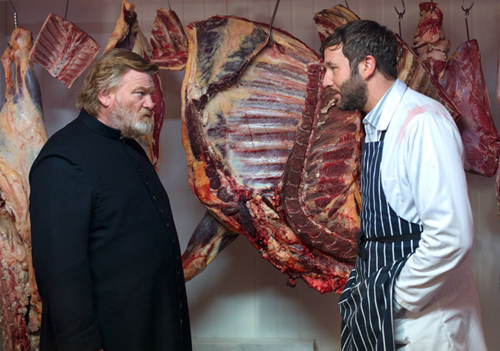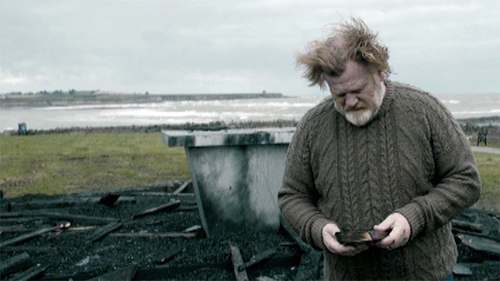Calvary – film review

If you were putting together a list of the greatest opening movie lines of all time, you'd probably find yourself willingly leaving out Calvary. Not because it's a flimsy throwaway line that lacks substance or seems ill-placed, however. No, it's the uncomfortable nature and context of the dialogue that will force you to surrender your attention – Calvary is as black as black comedies go.
The opening exchanges between Brendan Gleeson's Father James and an unidentified voice on the other side of the confessional grille is where the scene is fully set. Against the uncomfortable backdrop of the Catholic Church's sex scandals (though kept on the periphery of the issue by writer and director John Michael McDonagh), Calvary is a superb, punchy take on the whodunnit.
The voice – known to Gleeson but not to us – is menacing: "There’s no point in killing a bad priest — but killing a good one, that would be a show. I’m going to kill you, because you’re innocent. Sunday week, let’s say. Killing a priest on a Sunday, that’ll be a good one." But Calvary is gracious enough to nudge forward the promise that we're here to find out who the voice belongs to.

It could belong to any of the stellar cast assembled here. Chris O'Dowd, the local butcher; Dylan Moran, a financier crushed by Ireland's economic collapse but for whom wealth remains aplenty; atheist doctor and full-blown cynic Aidan Gillen; or soon-to-be-homeless pub landlord Pat Shortt all emerge as potential assailants. Or should that be victims? An intricate subtext of the film, perhaps?
Father James, we learn, has a week to put his house in order and to meet his fate. And you may be wise to not come into this expecting riotous laughs despite the comedic cast and the form exhibited in McDonagh/Gleeson's last outing, The Guard. There are many interactions to consider; the priest and parishioner; the father and daughter (Kelly Gillen); the master and dog. It borders on complexity, for sure.
We're offered snapshots into the lives of the characters that surround Father James's life in a sleepy County Sligo village and, like the opening dialogue, these aren't always comfortable either. It's not a ringing endorsement for modernity, that's for sure; offering a threat of cynicism with every turn, or even nihilism at its most bleak. But throughout, Gleeson shines through with supreme majesty.

McDonagh claims Calvary to be the second part of a "glorified suicide trilogy" that started with The Guard. Can we, therefore, expect Gleeson to reunite with McDonagh in the third part of the trilogy? On the evidence of Calvary, we can only hope so. It's hard to avoid enthusiastic hyperbole when it comes to describing Gleeson's performance in this film – it is a supreme example of lead acting.
The latest hi-fi, home cinema and tech news, reviews, buying advice and deals, direct to your inbox.
The negative aspects are few and far between. Gillen is almost parodic in his delivery of the character he plays, and his wispy lines seem best suited to Westeros, not west Ireland. And the denouement tries so hard to deliver a fitting conclusion that it almost overreaches and unravels the intensity and conviction delivered to this point.
Calvary's mix of the uncomfortable, the bleak and the life-affirming doesn't sound much of a draw on paper, but McDonagh/Gleeson makes it compelling viewing; the idea that shines through: "There's too much talk about sins and not enough of virtues".

by Pete Hayman
Pete was content editor on What Hi-Fi?, overseeing production and publication of digital content. In creating and curating feature articles for web and print consumption, he provided digital and editorial expertise and support to help reposition What Hi-Fi? as a ‘digital-first’ title; reflecting the contemporary media trends. He is now a senior content strategist.
